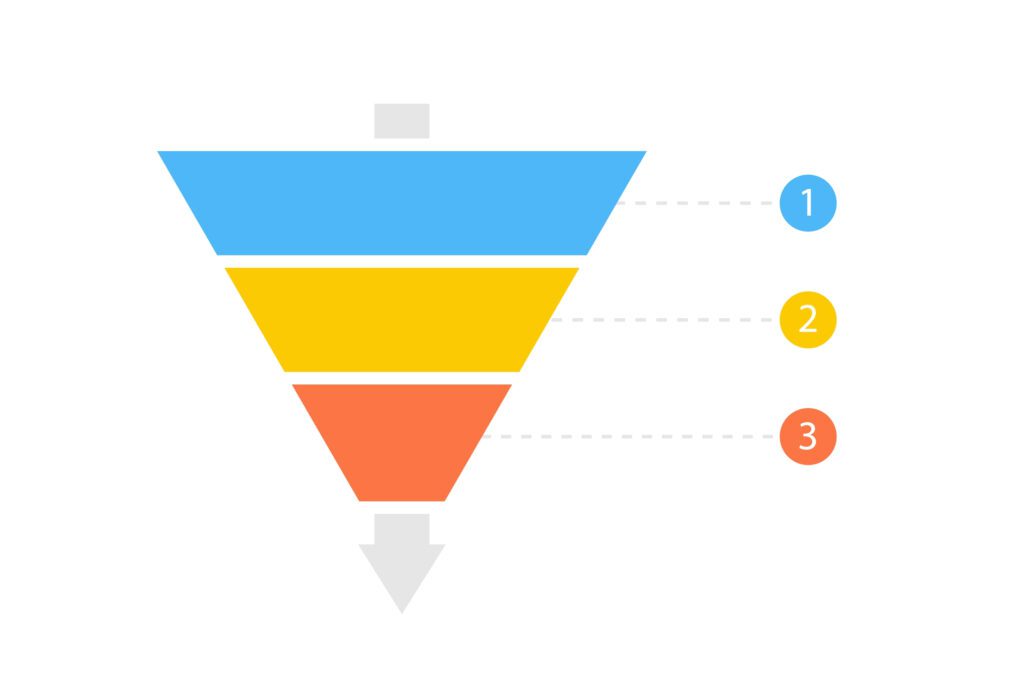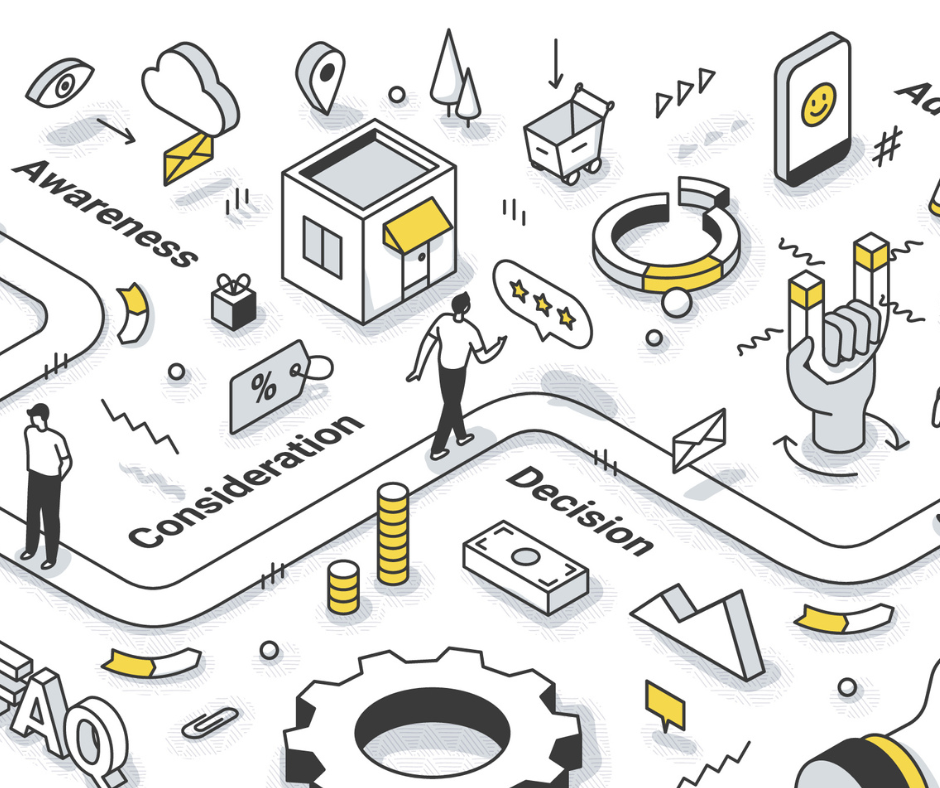
Create a Marketing Funnel to Attract and Convert Your Ideal Customer
Looking for ways to attract more customers and increase your sales? As a business, we're sure your answer is yes. Let's talk about how marketing funnels are a great step to attract and convert those ideal customers.
A marketing funnel is a proven method of turning website visitors into paying customers by guiding them through the customer journey from awareness, interest, decision-making, and purchase. By creating an effective marketing funnel that speaks directly to your target audience, you can convert leads into loyal customers who will come back again and again. In this blog post, we'll discuss creating a successful marketing funnel to help you reach your business goals.
Table of Contents:
- Steps to an Effective Marketing Funnel
- The Customer Journey
- Targeting Your Ideal Customers
- Tips For Optimizing Each Stage Of The Funnel To Increase Conversions
- Best Practices For Measuring Success And Optimizing Results Over Time
- Final Thoughts
Steps to an Effective Marketing Funnel
Creating an effective marketing funnel requires a keen understanding of the customer journey from initial awareness to purchase. It’s important to think about your ideal customer and their needs and the type of content that will capture and retain their attention. Here are some tips for creating a successful marketing funnel:
- Start with research: Before you begin crafting your marketing funnel, take some time to research your ideal customer. This can include both qualitative and quantitative data such as demographics, purchasing habits, interests, motivations, and more. Knowing who you’re targeting will help you create content that resonates with them.
- Design Your Funnel: Now that you know your target audience, it’s time to design the structure of your funnel. Think about what type of content should go at each stage to move potential customers further down the sales cycle. This could include blog posts, videos, webinars, email sequences, or any other form of content that speaks directly to your audience’s needs or interests.
- Optimize for Conversions: Once you have a basic structure in place for your funnel, optimize each stage for conversions by providing relevant content and calls-to-action (CTAs).
For example, if someone has just read an article about how to reduce stress levels through yoga poses, then you would want to provide CTAs that lead them towards checking out a yoga class or buying a yoga mat product recommendation – this helps move them further down the sales cycle towards making a purchase decision - Measure Results: As with any marketing strategy, it's important to measure results over time to figure out what works best and where there may be opportunities for improvement. Set up tracking tools like Google Analytics to see which pieces of content are driving conversions and determine areas where you need additional optimization or testing.
Following these steps and optimizing each stage of the funnel for conversions with relevant content tailored specifically toward your ideal customer base can help ensure greater success in converting leads into loyal customers who come back again and again!

The Customer Journey
The customer journey typically consists of four stages, which all contribute to the overall success of a business' marketing funnel.
1. Awareness
The first stage in the customer journey is awareness - this is when potential customers become aware of a company's offerings or services. This is where businesses need to capture attention with engaging content and effective messaging.
For example, companies can use social media platforms like Facebook, Instagram, or YouTube to reach new audiences and create brand awareness with ad campaigns, influencer collaborations, and other creative content. Moreover, businesses can leverage SEO tactics such as optimizing website content for keywords, so their products/services are found more easily by potential customers through organic search results.
2. Interest
Once a customer is aware of a company's offerings, the next step is to pique their interest and encourage further exploration into the product/service being offered.
Additionally, to generate interest among potential customers, businesses should focus on providing relevant content that speaks directly to their needs and interests. For example, content such as informative blog posts, helpful video tutorials, or webinars are great ways to keep people engaged while they learn more about what your business has to offer them.
Businesses should also ensure that they have attractive product pages with clear descriptions and CTAs (Calls-to-Action) throughout the marketing funnel that leads customers to take action - such as signing up for a newsletter or downloading an ebook or white paper related to their purchase decision process.
3. Consideration
During this stage in the customer journey, potential customers have become more aware of what you're offering, but now they're considering whether it would be beneficial for them to actually purchase it or not. Here businesses will want to provide additional information about how their products/services solve specific problems for customers that go beyond any initial promises made - this could be in the form of case studies and detailed reviews from previous buyers who were happy with their purchase decisions.
It's also important here that businesses focus on highlighting features rather than benefits so potential customers can make an educated choice before committing any money towards making a purchase decision. Also, providing discounts or special offers during this stage can help move customers further along in their decision-making process toward actually buying something from your company.
4. Purchase
This is the final stage in the customer journey, where prospects have evaluated all options available to them and decided that yours is indeed worth investing in! During this stage, businesses need to ensure that all payments are secure and there are no hidden costs involved throughout each transaction - this helps build trust between consumers and companies, which leads to repeat purchases down the line! Then businesses should also think about post-purchase engagement strategies such as thank you messages, follow-up emails with helpful resources/information related to their purchase decisions, etc., as this help foster stronger relationships between companies and customers going forward.

Targeting Your Ideal Customers
To effectively target your ideal customers and maximize the success of your marketing funnel, businesses should develop an in-depth understanding of their target audience, meaning taking time to research who they are, what their needs and wants are, and how they can be best served by your company's products/services. Businesses should also focus on creating a personalized experience for their ideal customers by utilizing data-driven insights gathered from customer touchpoints such as website visits, email campaigns, etc. Then, businesses should consider running A/B tests for different aspects of the funnel (e.g., copywriting, images used in ads/emails), which can help them identify which elements perform better with each target segment.
Also, businesses should look into leveraging platforms like Google Ads or Facebook Ads to create targeted campaigns based on criteria such as location or user behavior. These platforms offer detailed analytics that provides valuable insights into how well certain ad sets are performing so businesses can adjust their approach accordingly. Moreover, these platforms also allow businesses to retarget potential customers who may have abandoned shopping carts or left without completing a purchase - this helps ensure that companies remain top-of-mind with ideal customers so that they come back in the future when they may be more likely to make a purchase decision.
Businesses should also focus on building relationships with potential customers by setting up social media accounts specifically dedicated to engaging with them (e.g., Twitter and Reddit). Here companies can share helpful content along with responding to questions and comments from customers to build trust and loyalty over time - this will help ensure that even if someone doesn't convert immediately from the initial contact point, they will still remember you down the line when it comes time to make a purchase decision.
Finally, businesses need to keep testing and refining all aspects of their marketing funnel, as this will help them find what works best for each target segment and optimize performance over time. This could mean running experiments on different types of content or messaging approaches for emails or ad sets - the idea is to continually evaluate the effectiveness of each element within the marketing funnel so that you can identify areas where changes need to be made to increase conversion rates among ideal customers.
Tips For Optimizing Each Stage Of The Funnel To Increase Conversions
- Evaluate payment security and eliminate hidden costs to build trust with customers.
- Utilize post-purchase engagement strategies such as thank you messages and follow up emails to foster relationships with customers.
- Leverage data-driven insights from customer touchpoints to create a personalized experience for each target segment.
- Run A/B tests on different elements of the funnel (copywriting, images etc.) to identify what works best for each target segment.
- Use Google Ads or Facebook Ads platforms to create targeted campaigns based on criteria such as location or user behavior, then analyze their performance using detailed analytics tools available on these platforms in order to optimize results over time.
- Utilize social media accounts dedicated towards engaging with potential customers by sharing helpful content and responding promptly when asked questions or comments - this will help develop relationships over time leading up to conversions down the line if not immediately after initial contact point(s).
- Continually test and refine all aspects of the marketing funnel in order to find what works best for each target segment so that conversion rates can be increased among ideal customers.
Best Practices For Measuring Success And Optimizing Results Over Time
Measuring success and optimizing results over time can be achieved through a variety of methods. First, companies should track key metrics such as click-through rates (CTR), cost per click (CPC), cost per acquisition (CPA), and return on investment (ROI). These metrics will help businesses understand how effective their campaigns are in terms of generating leads and converting customers. Additionally, companies should pay attention to other KPIs, such as the lifetime value of a customer or average order value, to better understand their ideal customer and tailor their marketing efforts accordingly.
Companies should also consider running tests to determine the effectiveness of different elements within their funnel. For example, A/B testing can be used to compare different versions of ads or emails to identify which ones work best with each target segment. Companies can also leverage platforms such as Google Ads or Facebook Ads, which offer detailed analytics that provide valuable insights into how well certain ad sets are performing so businesses can adjust their approach accordingly. By leveraging these tools, businesses can optimize their campaigns for better results over time. It's also important for companies to stay up-to-date on trends in the market so that they can make any necessary changes to their campaigns or messaging strategies in order to better reach potential customers. This could involve researching what types of content resonate most with target audiences or researching emerging technologies or platforms that could be leveraged for better engagement rates.
Additionally, companies should take advantage of powerful data analytics tools available today that allow them to track customer behavior across multiple touchpoints and use this information to refine their strategies and develop more personalized experiences for each target segment. Finally, businesses should ensure they have a comprehensive system in place for monitoring customer feedback - this could involve utilizing surveys or analyzing reviews left by customers on social media channels - as this will provide valuable insights into what is working well and what needs improvement within the marketing funnel. This kind of insight allows companies to make informed decisions when it comes time to optimize results over time – enabling better ROI, higher engagement rates, increased conversions, and more delighted customers overall!
Final Thoughts
Creating a marketing funnel is one of the most effective ways to attract and convert your ideal customer. With an understanding of how customers think, feel, and make decisions, you can craft content that speaks directly to them. By making sure each step in the funnel appeals to their needs, wants, and desires, you'll be able to turn leads into conversions at a much higher rate. Now it's time for you to take action! Start by creating buyer personas for your target audience so you can learn more about who they are and what motivates them. From there, create compelling offers with powerful calls to action tailored specifically towards those personas. Once implemented, keep track of where potential buyers drop off or get stuck to refine the process until it works perfectly every time!
Interested in creating marketing funnels or streamlining your current ones? Set up a free consultation with us here at Two Trees PPC. We look forward to helping your grow your business.

